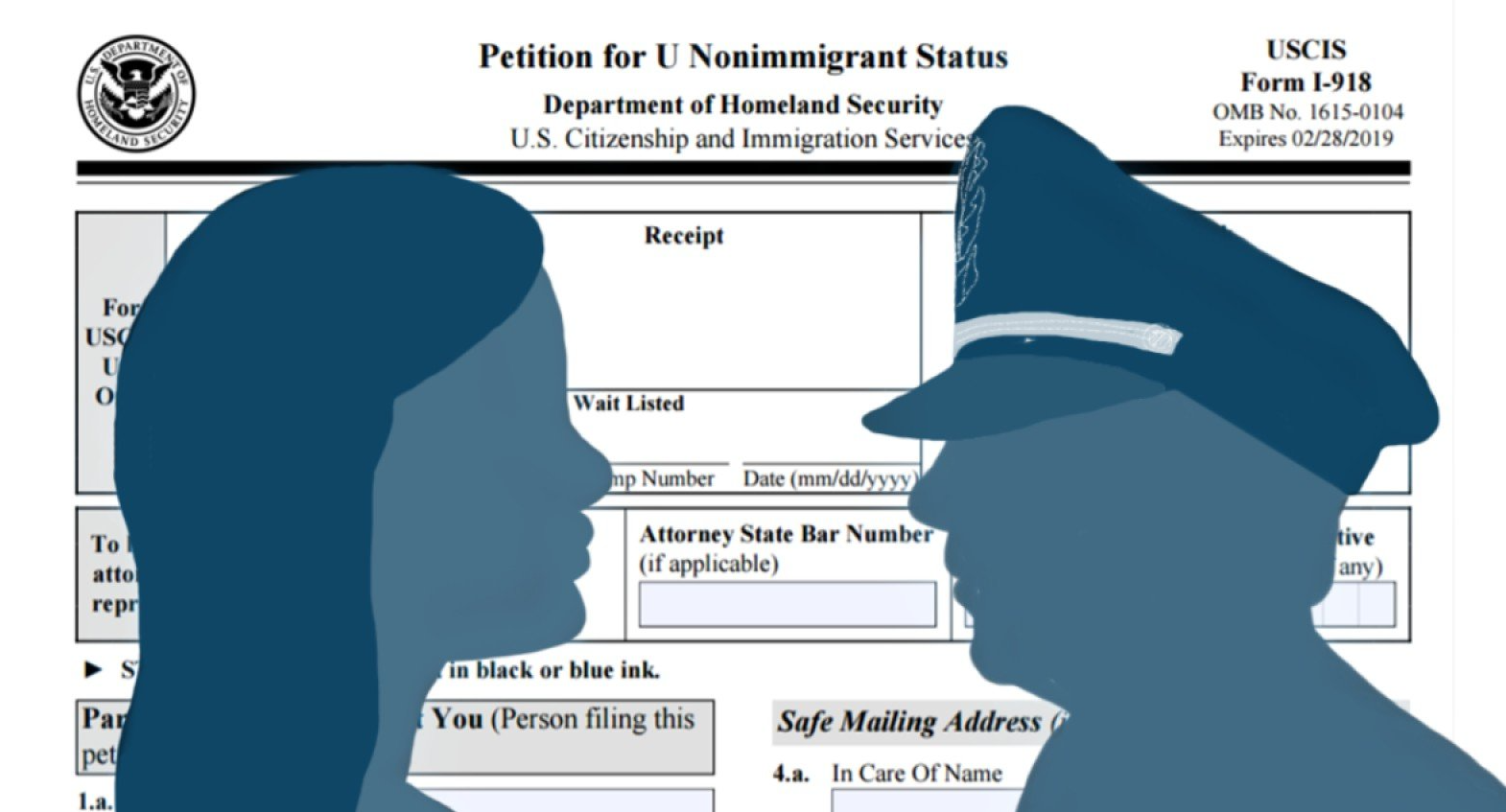¿Qué sucede después de enviar una solicitud de visa U?
Equipo de Santos Lloyd Law • May 26, 2022

Click here to read this article in English
Para obtener información sobre qué es una visa U y quién es elegible para ella, lea aquí. Esta publicación de blog analiza lo que sucede después de enviar la petición de visa U.
¿Cuánto tiempo tengo que esperar para obtener una decisión sobre la Visa U?
A partir de junio de 2021, el tiempo de espera para una decisión sobre la visa U es de aproximadamente 5 años. Es probable que el tiempo de espera sea más extenso para quienes presenten la solicitud en el 2022 porque hay una gran acumulación de solicitudes de visa U en espera de adjudicación.
¿Por qué el tiempo de espera es tan largo?
USCIS limita la cantidad de visas U cada año a 10,000, a pesar de que decenas de miles de solicitantes solicitan cada año esta visa. Una vez que se alcanza el límite, los solicitantes restantes se colocan en una lista de espera. Esto crea un retraso que se remonta a aproximadamente cinco años.
¿Puedo trabajar mientras mi petición de visa U está pendiente?
Debido a la acumulación de solicitudes pendientes, USCIS puede otorgar permisos de trabajo para aquellos que esperan una decisión final sobre sus solicitudes de visa U. Una vez que se otorga el permiso de trabajo, puede trabajar mientras espera la decisión final. El permiso de trabajo tiene una duración de cuatro años, pero se puede extender hasta que se decida la petición de visa U.
¿Estoy sujeto a deportación mientras mi solicitud está pendiente?
De manera similar al permiso de trabajo, los solicitantes pueden solicitar una "acción diferida" que dura cuatro años, pero puede extenderse hasta que se decida la petición de visa U. La “acción diferida” no es un estatus migratorio, pero le permite a USCIS otorgarle un permiso de trabajo para que pueda trabajar legalmente mientras espera la decisión sobre su petición de visa U. Con la acción diferida, el gobierno lo considera de baja prioridad para la deportación, lo que hace que la deportación sea menos probable.
¿Cuánto tiempo tomará para que me otorguen mi permiso de trabajo y acción diferida?
Pueden pasar varios años antes de que se conceda su solicitud de permiso de trabajo/acción diferida. Esto se debe a que la acumulación de visas U es muy extensa. Como resultado, no tendrá un permiso de trabajo ni ningún estatus legal o protección contra la deportación mientras las solicitudes de permiso de trabajo/acción diferida estén pendientes.
Si mi solicitud de visa U es denegada, ¿seré deportado?
Si USCIS niega su solicitud de una visa U, entonces su estado sigue siendo el mismo que tenía antes de presentar la solicitud. La denegación no activará automáticamente los procedimientos de deportaciones.
Si se aprueba mi petición de visa U, ¿cuándo puedo solicitar la residencia permanente legal (Tarjeta verde o Green Card)?
Debe tener una visa U durante tres años antes de poder solicitar la residencia permanente legal. Para ser elegible para la residencia permanente legal, se deben cumplir los siguientes criterios:
- Ha estado físicamente en los EE. UU. durante un "período continuo" de al menos tres años desde la fecha en que se le otorgó la visa U. Un “período continuo” significa que no puede salir de los EE. UU. durante 90 días seguidos o 180 días en total durante los tres años.
- Usted cooperó con las fuerzas del orden público si le pidieron que cooperará con la investigación criminal o el enjuiciamiento después de que se le concediera la visa U.
- Su presencia continua en los Estados Unidos está “justificada por motivos humanitarios, para garantizar la unidad familiar, o es de interés público”. Esta es una prueba de equilibrio que se deja a la discreción del gobierno. Sin embargo, si no tiene antecedentes penales o violaciones de inmigración significativas en el pasado, es probable que se considere "de interés público" que continúe en los EE. UU.
¿Cuánto tardará USCIS en decidir mi solicitud de tarjeta verde?
Tomará aproximadamente dos años, pero los plazos están sujetos a cambios. Mientras espera la decisión, USCIS extenderá su visa U y permiso de trabajo.
Si desea obtener más información sobre cómo solicitar una visa U, comuníquese con el bufete de abogados Santos Lloyd y nuestro talentoso equipo de experimentados abogados de inmigración podrá ayudarlo.
Este blog no pretende ser un consejo legal y nada aquí debe interpretarse como el establecimiento de una relación abogado-cliente. Programe una consulta con un abogado de inmigración antes de actuar sobre cualquier información que lea aquí.
This Facebook widget is no longer supported.
Similar Posts

The U nonimmigrant status (U visa) offers vital protection and legal relief to victims of certain crimes who have suffered mental or physical abuse and are willing to assist law enforcement in the investigation or prosecution of the crime. U visa recipients are granted a work authorization card and can live and work legally in the United States for up to four years, with a path to lawful permanent residency (green card) after having a U visa for three years. The U visa serves as a beacon of hope for survivors of crime who courageously step forward to help law enforcement while navigating their own recovery. Understanding the eligibility criteria and gathering the right documentation is essential to building a strong case. To qualify for a U visa, an applicant must meet all of the following criteria: 1. Victim of a Qualifying Crime You must have been a victim of a qualifying criminal activity , such as: Domestic violence Sexual assault Human trafficking Kidnapping Felonious assault Extortion Witness tampering Other serious offenses A full list of qualifying crimes is provided by U.S. Citizenship and Immigration Services under INA § 101(a)(15)(U). See also: https://www.uscis.gov/humanitarian/victims-of-criminal-activity-u-nonimmigrant-status . 2. Suffered Substantial Physical or Mental Abuse You must demonstrate that you suffered substantial harm as a result of the crime. This may include: Physical injuries Psychological trauma Lasting emotional distress 3. Helpful to Law Enforcement You must be, have been, or are likely to be helpful in the investigation or prosecution of the crime. This includes: Reporting the crime to authorities Cooperating with police or prosecutors Providing information that aids law enforcement efforts A law enforcement certification (Form I-918, Supplement B) is required as proof of this cooperation. 4. The Crime Occurred in the U.S. or Violated U.S. Laws The criminal activity must have: Taken place in the U.S., its territories, or possessions, and Violated U.S. federal, state, or local laws Applicants must also be admissible to the United States. If you are not, based on your immigration history, you may request a waiver using Form I-192 (Application for Advance Permission to Enter as a Nonimmigrant) . Certain qualifying family members may be included in your U visa petition: If you are under 21 years old: Your parents, unmarried siblings under 18, spouse, and children may be eligible to apply with you. If you are 21 years or older: Your spouse and children may qualify to apply with you. Each derivative must meet specific requirements and file appropriate forms. If you have any questions or would like to know more about the U visa eligibility requirements, contact our office to schedule a consultation with one of our experienced immigration attorneys.

In recent weeks, the U.S. government has moved to terminate Temporary Protected Status (TPS) for multiple countries, sparking a wave of last-minute litigation and creating significant uncertainty for beneficiaries. This shift is having a profound impact on those who rely on TPS for lawful presence and work authorization in the United States. Across the country, federal courts have intervened to pause or block scheduled TPS terminations for several countries, including Burma (Myanmar), Ethiopia, Haiti, South Sudan, and Syria. In response to these court orders, USCIS has updated its webpages to indicate that TPS status and related Employment Authorization Documents (EADs) are extended for these populations. However, USCIS is intentionally not providing specific new end dates for EAD validity while the litigation remains in flux. The Department of Homeland Security (DHS) has prominently noted that it "vehemently disagrees" with these court orders and is actively working with the Department of Justice on next steps. This legal landscape remains highly unpredictable and varies drastically depending on the country of origin. For example, on February 9, 2026, the 9th Circuit Court of Appeals granted a stay allowing the government to proceed with the termination of TPS for Nicaragua, Honduras, and Nepal while the underlying legal challenges continue. Because of this ruling, the automatic extension of work authorization for these individuals has ended, and employers are now required to reverify the work authorization of affected employees, who must present alternative valid documentation to continue their employment. These rapid changes and the lack of clear end dates are causing complications beyond the workplace. Because driver's licenses often track the length of an individual's authorized stay, many DMVs are currently declining to issue or renew driver's licenses for impacted TPS populations. For employers, managing internal communications, avoiding onboarding errors, and navigating Form I-9 compliance has become increasingly complex. It is more important than ever to be well-prepared and proactive in monitoring these rapid changes. At Santos Lloyd Law Firm, P.C., our immigration attorneys are ready to guide you through this evolving process and ensure you are informed, and supported. Please contact us if you have questions or need assistance.

U.S. Citizenship and Immigration Services (USCIS) has announced a major change to the H-1B cap selection process. Under a final rule issued on December 29, 2025, USCIS will replace the long-standing random H-1B lottery with a wage-weighted selection system that favors higher-paid and more complex positions. The rule is scheduled to take effect on February 27, 2026 , just ahead of the fiscal year 2027 H-1B cap registration season, unless delayed by legal challenges. If implemented, USCIS is expected to release additional guidance explaining how employers must submit registrations under the revised process. This change marks one of the most significant reforms to the H-1B program in recent years. Up until 2025, all registrations were treated equally once the annual cap was reached. Under the new system, selection odds will be tied to wage levels based on the U.S. Department of Labor’s Occupational Employment and Wage Statistics data. All H-1B registrations will still be placed into a single selection pool, but registrations tied to higher wage levels will receive multiple entries into that pool, increasing their likelihood of selection. Lower wage levels will receive fewer entries, making selection less likely but not impossible. H-1B wage levels are not determined solely by salary. Each wage level reflects the complexity of the job, the level of responsibility involved, and the education and experience required . Entry-level positions involving routine duties and close supervision are generally classified at the lowest wage level, while positions requiring independent judgment, advanced skills, and significant responsibility fall into higher wage levels. The highest wage level is reserved for roles that involve expert knowledge, strategic decision-making, and substantial leadership or technical authority. USCIS is expected to closely scrutinize selected petitions to ensure that the wage level claimed during registration is supported by the job duties and salary offered in the petition. Any discrepancies between the registration and the petition may result in requests for evidence, denials, or enforcement action. With the elimination of the purely random lottery, employers should begin preparing early by carefully evaluating job descriptions, wage levels, and overall H-1B strategy. Accurate classification and thoughtful planning will be essential under this new wage-based selection system. If you are an employer considering H-1B sponsorship, or a foreign professional wondering whether your position may qualify under the new wage-based system, consulting with experienced immigration counsel is more important than ever. Santos Lloyd Law is actively advising clients on H-1B cap registrations and strategy under the new rules. To discuss your options or determine whether you may qualify, contact our office to schedule a consultation.

During the recent administration there has been an increase in issuance of Requests for Evidence for EB-1A petitions for those of Extraordinary Ability. A Request for Evidence is a request that is made by USCIS that should explain how the evidence is deficient in proving the criteria argued and what additional evidence needs to be provided by the applicant to meet the criteria. EB-1A petitions are already normally subject to higher scrutiny because their approval is the first step needed to apply for Lawful Permanent Residence or a green card. USCIS normally requires not just evidence but that the evidence be provided with context and information to show why it matters in a particular field. For example, if you were providing evidence of your membership in an organization that requires outstanding achievements of its members, just providing evidence of the membership is not enough. You must explain what that membership is and provide background information on the organization granting the membership. You also need to provide evidence on the criteria that is used to select the members, information on those who select the members to show that they are recognized experts, other documentation such as articles about the membership organization to show its importance, and any other relevant evidence and background information to show that the criteria is met. A request for evidence being issued prior to the current administration was not uncommon, but in the current climate it is more surprising to not receive a request for evidence for this type of case. It is important to remember that a request for evidence is not a denial. Depending on the validity of the information in the request and the substance some Requests for Evidence can be overcome, and the case be approved. It is important to carefully review the request and note if there are any errors in the content and application of the regulations by USCIS. If you have an attorney, you should work with them and make sure that you provide any evidence you think may be helpful. Although there is a deadline by which a response must be submitted, attention to detail and patience will go a long way when dealing with having to respond to a request for evidence. If you believe you may qualify for this type of visa, please feel free to contact our office.




